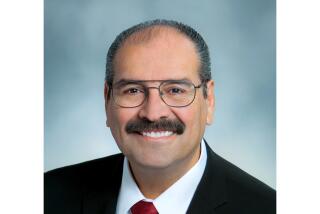Gonzales’ testimony is scrutinized
- Share via
WASHINGTON — The Justice Department’s inspector general acknowledged Thursday that he was examining whether outgoing Atty. Gen. Alberto R. Gonzales made false or misleading statements to Congress about the National Security Agency’s terrorist surveillance program, the fired U.S. attorneys affair and other subjects.
Responding to a congressional query, Inspector General Glenn A. Fine said his office was investigating Gonzales’ conduct as part of several ongoing probes into the activities of department lawyers on Gonzales’ watch. Though it had long been assumed that the statements Gonzales had made would be part of those inquiries, it was the first public confirmation by the department’s internal watchdog.
“You identified five issues and asked that we investigate whether the statements made by the attorney general were intentionally false, misleading or inappropriate,” Fine wrote in a letter to Sen. Patrick J. Leahy (D-Vt.). “The OIG has ongoing investigations that relate to most of the subjects addressed by the attorney general’s testimony that you identified.”
Gonzales on Monday announced his resignation, effective Sept. 17, after a tumultuous 2 1/2 years as attorney general. The White House has launched a search for a new attorney general, but President Bush is not expected to announce his choice for a successor before leaving Monday for the Asia-Pacific economic summit in Australia.
In recent months, Democratic and Republican lawmakers had lost confidence in Gonzales because of his perceived lack of candor.
“The current attorney general is leaving, but these questions remain,” said Leahy, chairman of the Senate Judiciary Committee. “It is appropriate that the inspector general will examine whether the attorney general was honest with this and other congressional committees about these crucial issues.”
At a news conference in March, Gonzales denied that he was involved in deliberations that led to the firing of nine U.S. attorneys last year. But internal Justice Department documents that surfaced later showed he attended at least one meeting in which the firings were discussed and approved.
Gonzales also has come under attack for telling members of Congress that there was little dissent within the Bush administration about the legality of a warrantless electronic surveillance program that was launched by the NSA after the Sept. 11 attacks.
But that appeared to be contradicted in testimony by a former deputy attorney general, who said several top Justice officials at one point threatened to resign over a disagreement with the White House.
Without identifying the program, James B. Comey testified that he and other Justice officials were very concerned about its legality, which led to an unusual hospital-room standoff in 2004 between Gonzales and then-Atty. Gen. John Ashcroft. Comey, acting for Ashcroft, had refused to approve the program; Gonzales, then the White House counsel, tried to persuade the bedridden Ashcroft to countermand Comey, although Ashcroft refused.
In July, Gonzales’ testimony was further undercut by FBI Director Robert S. Mueller III, who told the House Judiciary Committee that he had had serious reservations about the wiretapping program.
In an Aug. 16 letter, Leahy asked Fine to assess other statements by Gonzales, including testimony that he had not talked with other Justice employees about the ongoing U.S. attorney probe because he did not want to be perceived as trying to influence the investigation. A former top aide who was involved in the firings, Monica M. Goodling, subsequently testified that Gonzales had tried to engage her in a discussion about the series of events leading to the dismissal of the prosecutors and that the approach had made her “uncomfortable.”
The Justice Department had no comment on Fine’s letter.
Gonzales has said that he misspoke when he told reporters that he was not involved in selecting U.S. attorneys to be fired. He has stood by his testimony that there was no internal dissent over the anti-terrorism program -- but acknowledged there was dissent with other intelligence activities that remain classified.
Gonzales has also denied trying to influence the testimony of Goodling, saying he was only attempting to reassure a distraught employee that she had done nothing wrong.
--
More to Read
Get the L.A. Times Politics newsletter
Deeply reported insights into legislation, politics and policy from Sacramento, Washington and beyond. In your inbox twice per week.
You may occasionally receive promotional content from the Los Angeles Times.










